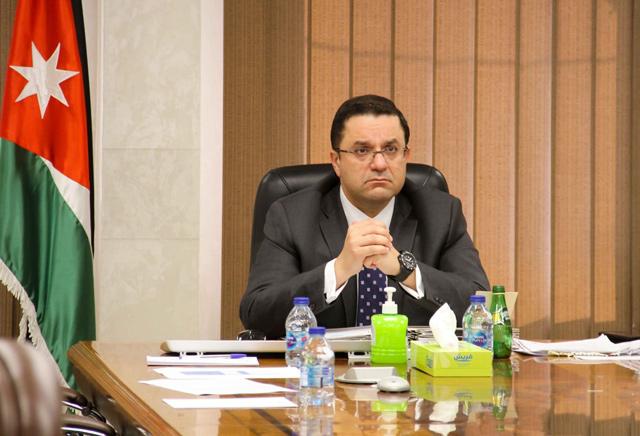You are here
Al-Ississ calls for investment in human safety, resilience measures for emerging markets at G20 virtual summit
By JT - Jul 11,2020 - Last updated at Jul 11,2020

Minister of Finance Mohamad Al-Ississ attends a session of the G20 via videoconference (Photo courtesy of the Finance Ministry)
AMMAN — Representing Jordan for a session by the G20 titled “Policy options to tackle the current situation and support the return of capital flows to emerging economies”, Minister of Finance Mohamad Al-Ississ stressed that Jordan is “an example of the returns of investing in human safety”.
With one of the lowest COVID-10 cases per capita worldwide due to a nation-wide lockdown and widespread testing, Jordan was able to reopen its economy at an early stage and regain competitiveness, a statement from the Finance Ministry quoted Al-Ississ as saying.
Al-Ississ also called on the international community “not to neglect middle-income countries such as Jordan”.
He noted, like COVID-19, preventing illness is more economically effective than treating the symptoms, and the same can be said of preventative liquidity injections and fiscal space, according to the statement.
Al-Ississ expressed concern about the coronavirus-induced decline in remittances and tourism receipts, noting that declines in these two forms of capital are most likely to impact vulnerable communities who previously relied on them for livelihood across emerging markets.
However, Al-Ississ noted that there is a chance for countries who have displayed resilience such as Jordan to attract investors and capital, citing Jordan’s recent “unprecedented” Eurobond issuance.
During a press conference explaining the issuance on Wednesday, the minister noted that the competitive interest rates and oversubscription of Jordan’s Eurobond is “a testament to its resilience over time, and its most recent policies in suppressing a COVID-19 wave”.
Last week, Jordan issued a double-tranche Eurobond of $500 million at 4.95 per cent over five-year maturity and $1.25 billion at 5.85 per cent over 10-year maturity.
“Decisions related to debt are always difficult painful, but if required they should be done in a manner that minimises losses and maximises the benefit for the public,” Al-Ississ had noted in the press conference.
Jordan witnessed a 19 per cent growth in its interest payments in the 2020 General Budget pre-COVID, but the competitive interest rates of the Eurobond issuance are expected to go towards decreasing that.
Related Articles
AMMAN — Jordan, on behalf of the Ministry of Finance and in cooperation with the Central Bank of Jordan, on Tuesday issued a double-tranche
AMMAN — Jordan has successfully issued $650-million worth of Eurobonds on international markets, with a fixed coupon rate of 7.75 per cent a
AMMAN — The Finance Minister Mohamad Al-Ississ, said that the new established programme with the International Monetary Fund (IMF) is an “in

















